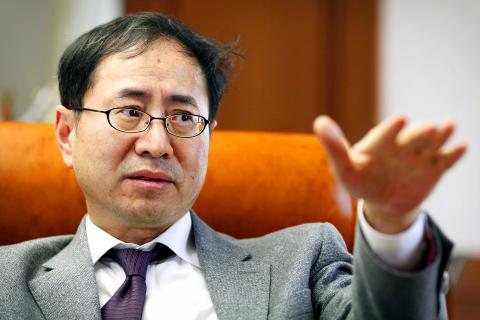Bank of Korea board member Moon Woo-sik sees no immediate need to alter benchmark interest rates and says it is “too early” for any central bank response to the yen’s slide against the South Korean won.
“There are good reasons why people tend to be more optimistic this year than last year,” Moon, 52, said in an interview in Seoul last week.
There is no “important reason to take monetary-policy actions quickly” unless the South Korean economy declines further, he said.

Photo: Bloomberg
Central bank policymakers meet on Thursday next week to set rates as Hyundai Motor Co and Samsung Electronics Co grapple with won gains and the likelihood of economic and fiscal policy shifts after the scheduled Feb. 25 inauguration of South Korean president-elect Park Geun-hye.
Moon said business confidence and investment may gain in South Korea as risks recede from Europe’s debt crisis and the so-called “fiscal cliff” of spending cuts and tax increases in the US.
Policymakers need to “wait and see” as South Korea’s economy shows signs of improving after already hitting bottom, Moon said. “I don’t think we’re in a very urgent situation.”
The South Korean won extended gains after Moon’s comments, rising 1.2 percent to 1,084.78 won per US dollar in Seoul, the biggest advance since December 2011, according to data compiled by Bloomberg.
It depreciated 3.9 percent in the last three weeks and touched 1,098.25 to the US dollar on Friday, the weakest level since Oct. 26 last year.
The won strengthened 1.5 percent to 11.71 won against the Japanese yen yesterday, the most since June last year, adding to gains in seven of the past eight weeks.
While a rate increase is unlikely in the “very near future,” it could become possible if the economy shows unexpected strength and inflation picks up, Moon said. South Korea is likely to “coordinate to some extent” when central banks globally exit from loose monetary policies, he added.
Moon’s view contrasts with Royal Bank of Scotland Group PLC last month forecasting an interest-rate reduction at the next meeting after the central bank pared its forecast for this year’s economic growth to 2.8 percent from an estimate of 3.2 percent in October last year. Analysts at HSBC Holdings PLC and Barclays Capital forecast no change.
Japanese Prime Minister Shinzo Abe’s campaign to expand monetary easing and revive his nation’s economy is driving down the yen, aiding exports of electronics and automobiles in competition with South Korea. The won has gained about 22 percent against the yen in six months.
“We have good reason to be worried about rapid depreciation of the yen,” Moon said.
At the same time, “it is too early” for the Bank of Korea to consider taking any action, he said, adding that policymakers will monitor currency volatility for any effects on economic and price stability.

Intel Corp chief executive officer Lip-Bu Tan (陳立武) is expected to meet with Taiwanese suppliers next month in conjunction with the opening of the Computex Taipei trade show, supply chain sources said on Monday. The visit, the first for Tan to Taiwan since assuming his new post last month, would be aimed at enhancing Intel’s ties with suppliers in Taiwan as he attempts to help turn around the struggling US chipmaker, the sources said. Tan is to hold a banquet to celebrate Intel’s 40-year presence in Taiwan before Computex opens on May 20 and invite dozens of Taiwanese suppliers to exchange views

Application-specific integrated circuit designer Faraday Technology Corp (智原) yesterday said that although revenue this quarter would decline 30 percent from last quarter, it retained its full-year forecast of revenue growth of 100 percent. The company attributed the quarterly drop to a slowdown in customers’ production of chips using Faraday’s advanced packaging technology. The company is still confident about its revenue growth this year, given its strong “design-win” — or the projects it won to help customers design their chips, Faraday president Steve Wang (王國雍) told an online earnings conference. “The design-win this year is better than we expected. We believe we will win

Chizuko Kimura has become the first female sushi chef in the world to win a Michelin star, fulfilling a promise she made to her dying husband to continue his legacy. The 54-year-old Japanese chef regained the Michelin star her late husband, Shunei Kimura, won three years ago for their Sushi Shunei restaurant in Paris. For Shunei Kimura, the star was a dream come true. However, the joy was short-lived. He died from cancer just three months later in June 2022. He was 65. The following year, the restaurant in the heart of Montmartre lost its star rating. Chizuko Kimura insisted that the new star is still down

While China’s leaders use their economic and political might to fight US President Donald Trump’s trade war “to the end,” its army of social media soldiers are embarking on a more humorous campaign online. Trump’s tariff blitz has seen Washington and Beijing impose eye-watering duties on imports from the other, fanning a standoff between the economic superpowers that has sparked global recession fears and sent markets into a tailspin. Trump says his policy is a response to years of being “ripped off” by other countries and aims to bring manufacturing to the US, forcing companies to employ US workers. However, China’s online warriors